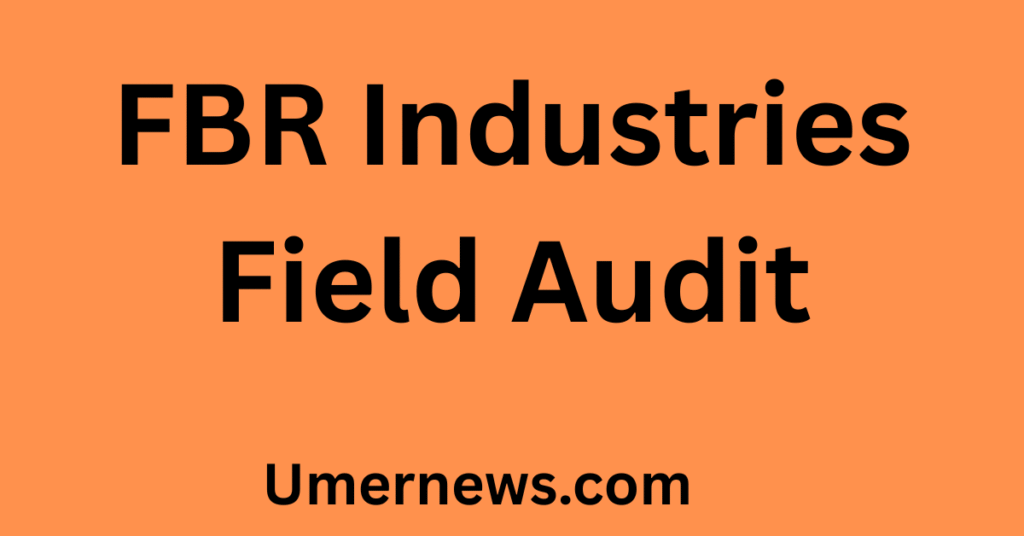FBR Industries Field Audit
Contents
- 1 FBR Industries Field Audit: Your Guide to Compliance Success
FBR Industries Field Audit: Your Guide to Compliance Success

Master the FBR industries field audit with our expert guide. Learn key steps, tips, and FAQs to ensure compliance and avoid penalties. Optimize your business today!
Introduction
Navigating an FBR industries field audit can feel overwhelming, but with the right preparation, it’s a manageable process that ensures your business stays compliant. The Federal Board of Revenue (FBR) in Pakistan conducts these audits to verify tax compliance, financial accuracy, and regulatory adherence. Whether you’re a small business owner or manage a large enterprise, understanding the audit process is critical to avoiding penalties and maintaining trust. In this guide, we’ll break down what an FBR field audit entails, how to prepare, and expert tips to streamline the process, saving you time and stress.
What Is an FBR Industries Field Audit?
An FBR industries field audit is an on-site inspection conducted by the Federal Board of Revenue to assess a company’s tax records, financial statements, and compliance with tax laws. Unlike desk audits, field audits involve FBR officials visiting your business premises to examine documents, verify transactions, and ensure accurate tax reporting.
Why Do FBR Field Audits Happen?
- Random Selection: Businesses may be chosen randomly to ensure widespread compliance.
- Discrepancies in Filings: Inconsistencies in tax returns or financial reports can trigger an audit.
- Industry-Specific Scrutiny: Certain sectors, like manufacturing or retail, may face higher scrutiny due to complex tax structures.
Key Areas of Focus
- Income Tax Records: Verification of reported income and deductions.
- Sales Tax Compliance: Ensuring accurate sales tax collection and remittance.
- Payroll and Withholding Taxes: Confirming employee tax deductions.
- Financial Statements: Checking for accuracy in profit, loss, and balance sheets.
How to Prepare for an FBR Field Audit
Preparation is the key to a smooth audit process. Follow these steps to ensure compliance and reduce stress during an FBR industries field audit.
Step 1: Organize Your Financial Records
- Maintain up-to-date ledgers, invoices, and receipts.
- Use accounting software like QuickBooks or Xero for accurate record-keeping.
- Ensure all tax filings (income, sales, and withholding taxes) are readily accessible.
Step 2: Conduct an Internal Review
- Perform a self-audit to identify potential discrepancies.
- Cross-check sales tax returns with invoices and purchase orders.
- Verify employee payroll records for accurate tax deductions.
Step 3: Train Your Team
- Brief employees on the audit process to avoid confusion.
- Designate a point person to communicate with FBR officials.
- Ensure staff know where key documents are stored.
Step 4: Consult a Tax Professional
Hiring a certified tax consultant can make a significant difference. According to Pakistan Tax Bar Association (rel=”nofollow”), professional guidance ensures compliance with complex tax laws and reduces audit risks.
Comparison: FBR Field Audit vs. Desk Audit
| Feature | Field Audit | Desk Audit |
|---|---|---|
| Location | On-site at business premises | Conducted remotely |
| Scope | Comprehensive financial review | Limited to specific documents |
| Duration | Days to weeks | Hours to days |
| Complexity | High, involves interviews | Moderate, document-based |
| Penalty Risk | Higher if discrepancies found | Lower, easier to resolve issues |
Table: Comparing FBR field audits and desk audits for better understanding.
Tips to Ace Your FBR Field Audit
- Be Transparent: Provide accurate and complete information to build trust with auditors.
- Respond Promptly: Address auditor queries quickly to avoid delays.
- Digitize Records: Use cloud-based storage for easy document access.
- Stay Updated: Monitor FBR’s official website (rel=”nofollow”) for policy changes.
- Document Everything: Keep a record of all communications with FBR officials.
Common Challenges and How to Overcome Them
- Incomplete Records: Use accounting software to maintain consistent records.
- Complex Tax Laws: Work with a tax consultant familiar with FBR regulations.
- Time Constraints: Start preparation early to avoid last-minute stress.
- Employee Errors: Train staff regularly to minimize mistakes in tax filings.
FAQs About FBR Industries Field Audits
Q: What triggers an FBR industries field audit?
A: An FBR field audit may be triggered by random selection, discrepancies in tax filings, or industry-specific scrutiny. High-risk sectors like manufacturing or retail are often prioritized. Ensuring accurate filings and maintaining clear records can reduce your chances of being audited.
Q: How long does an FBR field audit take?
A: The duration varies based on business size and complexity, typically lasting from a few days to weeks. Proper preparation, including organized records and prompt responses, can speed up the process and minimize disruptions.
Q: Can I appeal an FBR audit decision?
A: Yes, you can appeal an audit decision through the FBR’s appellate process. Consult a tax professional to file an appeal within the stipulated time frame, usually 30 days, as outlined on the FBR website (rel=”nofollow”).
Q: What documents are needed for an FBR field audit?
A: Auditors typically request income tax returns, sales tax records, payroll details, bank statements, and financial ledgers. Ensure all documents are organized and accessible, preferably in digital format, to streamline the audit process.
Q: How can I avoid penalties during an FBR audit?
A: Avoid penalties by maintaining accurate records, filing taxes on time, and addressing discrepancies before the audit. Transparency and cooperation with auditors also help demonstrate compliance and reduce penalty risks.
Q: Are small businesses exempt from FBR field audits?
A: No, small businesses are not exempt. FBR audits businesses of all sizes, though larger enterprises may face more frequent scrutiny. Regular compliance and record-keeping are essential for all businesses.
Q: What happens if discrepancies are found during an audit?
A: If discrepancies are found, FBR may issue penalties, additional taxes, or require corrective filings. Work with a tax consultant to address issues promptly and negotiate resolutions to minimize financial impact.
Conclusion
Mastering an FBR industries field audit requires preparation, transparency, and a solid understanding of tax compliance. By organizing records, consulting professionals, and staying proactive, you can navigate the audit process with confidence. This guide provides actionable steps to ensure your business remains compliant and penalty-free. Have questions or tips about FBR audits? Share them in the comments or explore our other resources for more insights!








